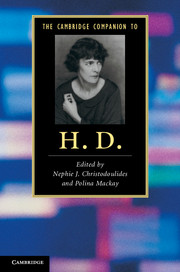9 - HERmione and other prose
from PART II - WORKS
Published online by Cambridge University Press: 28 November 2011
Summary
H.D. is best known as a poet: her imagist and long poems receive the most attention outside of a small circle of critics, and are usually the only parts of her oeuvre to be anthologised. Susan Stanford Friedman is the first critic to have written a book-length work on her prose: Penelope's Web: Gender, Modernity, H.D.'s Fiction establishes that H.D. was not only a frequent prose writer, but also an experimental one, comparable with Gertrude Stein and Virginia Woolf. Despite H.D.'s efforts to publish some of them, many of her prose works remained unpublished during her lifetime, and some have taken more than half a century to see the light of day. However, she wrote much more than she tried to publish, her prose being less vulnerable to the blocks and psychic breakdowns that halted her poetry. Like many modernists, H.D. worked over a lifetime at the same story, allowing it to evolve, mature and achieve a considerable depth, intricately and intimately bound up in her own life. Her poems, on the other hand, are more like offspring, separate, autonomous even in the post-imagist long poems, and inevitably breaking away from the life of their progenitor. Because of its distinct, intimate role in her writing, her prose is difficult, murky and opaque; but it is valuable not only as a significant experimental body of work but also as a rich source of companion material that informs her poetry in often unexpected ways.
- Type
- Chapter
- Information
- The Cambridge Companion to H. D. , pp. 127 - 142Publisher: Cambridge University PressPrint publication year: 2011



